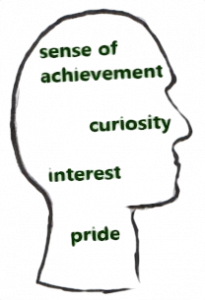Leadership is about helping others to succeed.
In essence, it’s that simple. But how do we do that?
TL;DR: We do this by finding the best alignment between work and individual motivators, then getting out of the way.
The importance of empathy
Helping others to succeed requires empathy. Without empathy you will struggle to be an effective leader.
Empathy allows you to see the world from another person’s perspective. Empathy gives you insight into their thoughts and feelings. It is essential for leadership because it allows us to understand what motivates other people.
If you struggle with empathy, there are ways to improve. Try:
- being present & focussed on others when they speak (eg instead of preoccupied by your phone)
- listening without interrupting – try being the last to speak
- asking questions of others – never assume you know what they think or why until they have actually told you; it’s lazy and disrespectful and you’re probably wrong
- arguing for the side of a debate you personally disagree with (try debating with knives)
Let’s assume for now you have empathy on tap.
Detecting motivation
Do you understand why your people come to work every day?
When do you see them smiling? When do they speak to you excitedly, or with passion?
What have they told you they enjoy doing? (Have you asked them?) What tasks will you sometimes see them working on outside normal hours?
Did they experiment with some new technology on their weekend that they were keen to tell you about?
These are the clues, and your job as a leader is to see, hear and decipher them.
The importance of Intrinsic motivation
Carrot and stick approaches have been proven to be ineffective (and often counter-productive) for knowledge workers. Science tells us that we do good work not because we get paid to do it, but because we are internally (intrinsically) motivated to do so.
Intrinsic motivators are things like:

- enjoying the process of a particular type of work
- wanting to do things well
- feeling accomplished
- satisfying our curiosity
- learning something new
- getting better at something
- being a part of something important or that we feel is worthwhile
- feeling useful
- expressing our creativity
- enjoying being part of a community
Your goal as a leader is to create an environment for your people where they are being intrinsically motivated to do their best work. This involves mapping the work your business needs to do with the intrinsic motivators your people possess.
Think about what’s involved in the work you need doing and find ways for people to explore their passions through it.
Extrinsic motivators
It would be nice if all of our time could be filled with work that is intrinsically motivated, but there will be extrinsic (external) motivators that sometimes matter as well. Here are some examples:
- deadlines
- operational crises
- negative feedback
- having to pay the mortgage, eat etc
- uninteresting work that needs to be done anyway
- bureaucratic stuff like filling out timesheets
The optimum situation for most people will be to spend as little time as possible on tasks like these. The more the balance tips towards external motivators, the less productive people will be, the lower the quality of their work and the less satisfaction they will be getting from doing it.
So, the other part of your job is to minimise the impact of extrinsic motivators.
If your boss gives you nothing but extrinsic motivators, he’s probably a toxic leader. That’s a topic for another day.
So to summarise, as a leader your most important job is to exercise the skill of empathy so you can
- know what your people are motivated to do and
- match up the business needs to those intrinsic motivators to the greatest degree possible
At the same time, you should be ensuring that as little of their energy as possible is expended on extrinsic motivators. This might mean you need to argue with the business for a better timesheeting solution, or better productivity tools. Make sure your people are paid enough that they aren’t spending energy on being annoyed about being underpaid. Buffer external events by being the firewall between your team and crises or negative feedback.
Read more
Dan Pink has a book about motivation for 21st century work called Drive. Here is a video that summarises his ideas about Autonomy, Mastery and Purpose.
What do you think? Share your thoughts in the comments section below.